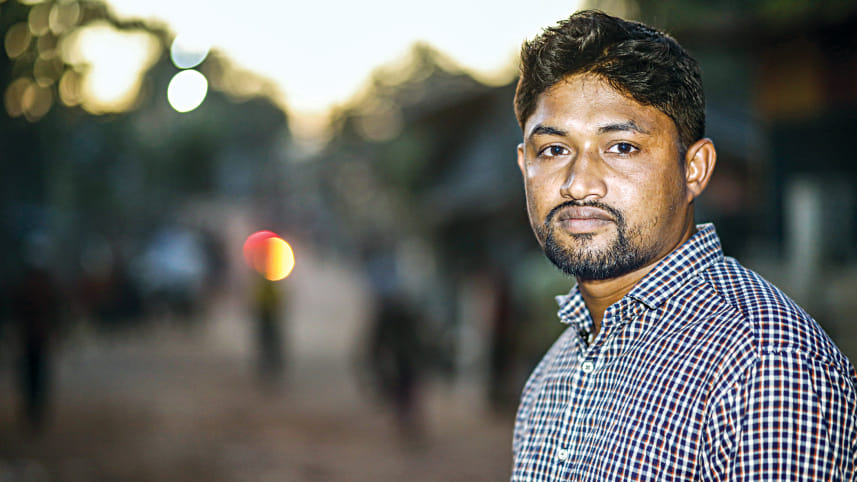Three generations stateless

"A person without a country is like a body without a heart."
Saidul Huq is one of those forgotten Rohingyas who has been here since before the exodus of 2017. In fact, his parents had fled to Bangladesh in 1991.
They are among the few thousand in Cox's Bazar who are officially recognised as refugees by Bangladesh and the United Nations High Commissioner for Refugees (UNHCR).
Saidul was born three years after his parents started living at Dumdumia in Teknaf. That was in 1994. Since then, Saidul has moved to the Kutupalong refugee camp.
Now a father of a son and a daughter, Saidul has never known life outside a refugee camp. Nor do his children. Saidul remembers that the first time he realised he could not have dreams was when he discovered he could not pursue higher studies.
The 28-year-old must have been a starry-eyed second grader when journalists came to speak to them at the camp. They took photos and wrote about the plight of refugees. The young boy was completely taken. He started dreaming of becoming a journalist like them so he too could write about the plight of people.
His dreams came to a cold, hard stop just three years later. There was no schooling available for him beyond the fifth grade. Young Saidul knew then, as he knows now, that the camp was his prison.
"Our world is our camp. We could not even dream of anything beyond it."
In the three decades that his family has been living in the camp, their only improvement has been that the flimsy tarpaulin has been replaced by a proper roof.
"And the bamboo walls have been replaced by concrete walls," says Saidul, mocking his development trajectory.
"This is like an open-air prison for us. We are all doomed with an indefinite prison sentence, because we don't know when we will be able to return," he says.
Saidul was born in Bangladesh without any possibility of return, just like his children.
"We don't know when we will return to our motherland. We don't know when we will get even our basic rights."
Apparently doomed to this fate, Saidul says his parents became refugees, and he was born a refugee, as were his children.
"There is no escape, it seems. And when I think of that, I feel like ending my life. It is devastating to see that my children's world is also confined to the camp."
Saidul said that their situation worsened since new Rohingyas arrived in 2017.
"Our movement was restricted further and our return to Myanmar also became more uncertain."
Although Saidul could not fulfil his dream of becoming a journalist, he continued to chase it, learning from private tutors.
"I saw people of my age doing great things, and I thought I should not give up. I started learning in my own way. I read whatever I got," he said, adding that he learnt the basics of photography when journalists came to the camp.
Then in 2020, along with some Rohingya youth, Saidul formed the Rohingya Film School which was later renamed Omar's Film School (OFS) in May 2020 after the sudden death of the founder, Omar Faruk.
He said that, as most of the people in the camp are young and have nothing to do, the school was established to train youth in photography and videography, to produce awareness videos around the Rohingya camps and produce documentaries on Rohingya Tradition and History.
"There are tens of thousands of Rohingyas in the camp. These stories need to be told before the global audience and preserved," he said, showing off their work — videos narrated in the Rohingya language, with English subtitles.
Saidul says he is not expecting his fate to change. "But what haunts me is that, like me, my children are also stateless. When I think of it, I cannot sleep."
Saidul was saying: "My dreams would be fulfilled if I were in my country. What scares me is that the global community seems to be forgetting about it with every passing day. The Rohingya issue is fading away."
But Saidul is hopeful. He believes that one day Rohingyas will return to their motherland. "It may not be me, but surely my children."
He says his heart bleeds when he ponders over the fact that it is now three generations that are stateless.
"A person without a country is like a body without a heart," says Saidul to the setting sun in the Bay of Bengal with misty eyes as his voice chokes.




 For all latest news, follow The Daily Star's Google News channel.
For all latest news, follow The Daily Star's Google News channel.
Comments